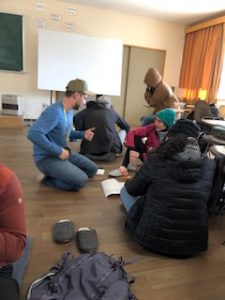I have always valued community and connections among people. In fact, the main reason why I decided to attend St. Olaf was because of how close and friendly everyone was on campus. I grew up in a really close family and loved forming friendships with other people. Because I grew up in a city where individuality is very common, I had always wondered what it would have been like to grow up in a small town where everyone knew each other. So, when I heard about the opportunity to spend an extended amount of time working work with volunteers and other St. Olaf students on a farm in rural Japan, I decided to go for it. It sounded like an experience I would always remember.
When we first arrived at Asian Rural Institute (ARI), Yukiko-san gave a presentation about ARI and its mission. I was definitely inspired but a bit skeptical at first.
ARI’s Mission: The mission of the Asian Rural Institute is to build an environmentally healthy, just and peaceful world, in which each person can live to his or her fullest potential. This mission is rooted in the love of Jesus Christ. To carry out this mission, we nurture and train rural leaders for a life of sharing. Leaders, both women and men, who live and work in grassroots rural communities primarily in Asia, Africa and the Pacific, form a community of learning each year together with staff and other residents. Through community-based learning we study the best ways for rural people to share and enhance local resources and abilities for the common good. We present a challenge to ourselves and to the whole world in our approach to food and life.
ARI Motto: “That We May Live Together.”
I think their motto, “that we may live together” is a very powerful statement. It calls for equality, diversity, shared experience, and respect among community members, but it also calls for a coexistence between people and nature. It allows everyone to live together; working, eating, talking, praying, and playing with one another. Yukiko-san was saying that there is no designated teacher or student at ARI because every member in the community has something to teach others.

I also appreciate ARI’s work to “build an environmentally healthy, just, and peaceful world, in which each person can live to his or her fullest potential.” Those three values are very important, especially as there are threats to environmentalism, justice, and peace across the globe. During on my experience here, I have seen those values in practice in daily life, but I am skeptical about how ARI hopes to build a world with that vision beyond the borders of its campus. They say they try to train leaders to carry out this mission but as Yukiko said, most of the graduates have not become rich or famous so they haven’t been able to have widespread impact. But maybe that’s not what’s important. If those people can go back to their local communities and have a real impact with the people living there, then the time they spent learning here will be worth it.
The work the graduates do in their local communities is undoubtedly valuable, but if they want to make a bigger impact, I believe ARI should encourage those leaders to pursue positions where their perspective can be of more value to society as a whole. By working for larger nonprofits and NGOs or running for public office, ARI leaders might have the opportunity to make change at a higher level.

The method that they train leaders–by nurturing them instead of lecturing them–is something I truly appreciate. Instead of being ordered to do things or being taught at, I believe that the best education comes from personal experience, hands-on work, and guidance from teachers. By preparing the environment for someone to learn, it allows them more independence and accountability. ARI wants to help people achieve their “fullest potential,” and I have seen that carried out in daily life here.
I have experienced the hands-on learning program here at ARI through my food life work and involvement in the ARI community and have grown because of it. Even though we occasionally had class where an ARI member would come in and explain big concepts to us, most of the learning was done outside the classroom where we could immerse ourselves in the environment and our work. This whole experience has been life changing. I visited a new country, saw amazing landscapes, made dozens of new friends, met with locals to discuss real problems, and learned about how I can live a more sustainable life, all while I found a deeper appreciation for the comforts of my life and the value of our time here on earth.
Recent Comments